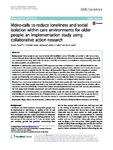Video-calls to reduce loneliness and social isolation within care environments for older people: an implementation study using collaborative action research
| dc.contributor.author | Zamir, S | |
| dc.contributor.author | Hennessy, CH | |
| dc.contributor.author | Taylor, Adrian | |
| dc.contributor.author | Jones, Ray | |
| dc.date.accessioned | 2018-05-22T14:38:14Z | |
| dc.date.issued | 2018-03-02 | |
| dc.identifier.issn | 1471-2318 | |
| dc.identifier.issn | 1471-2318 | |
| dc.identifier.other | ARTN 62 | |
| dc.identifier.uri | http://hdl.handle.net/10026.1/11555 | |
| dc.description.abstract |
BACKGROUND: Older people in care may be lonely with insufficient contact if families are unable to visit. Face-to-face contact through video-calls may help reduce loneliness, but little is known about the processes of engaging people in care environments in using video-calls. We aimed to identify the barriers to and facilitators of implementing video-calls for older people in care environments. METHODS: A collaborative action research (CAR) approach was taken to implement a video-call intervention in care environments. We undertook five steps of recruitment, planning, implementation, reflection and re-evaluation, in seven care homes and one hospital in the UK. The video-call intervention 'Skype on Wheels' (SoW) comprised a wheeled device that could hold an iPad and handset, and used Skype to provide a free video-call service. Care staff were collaborators who implemented the intervention within the care-setting by agreeing the intervention, recruiting older people and their family, and setting up video-calls. Field notes and reflective diaries on observations and conversations with staff, older people and family were maintained over 15 months, and analysed using thematic analysis. RESULTS: Four care homes implemented the intervention. Eight older people with their respective social contacts made use of video-calls. Older people were able to use SoW with assistance from staff, and enjoyed the use of video-calls to stay better connected with family. However five barriers towards implementation included staff turnover, risk averseness, the SoW design, lack of family commitment and staff attitudes regarding technology. CONCLUSIONS: The SoW intervention, or something similar, could aid older people to stay better connected with their families in care environments, but if implemented as part of a rigorous evaluation, then co-production of the intervention at each recruitment site may be needed to overcome barriers and maximise engagement. | |
| dc.format.extent | 62- | |
| dc.format.medium | Electronic | |
| dc.language | en | |
| dc.language.iso | en | |
| dc.publisher | BioMed Central | |
| dc.subject | Skype | |
| dc.subject | Video-calls | |
| dc.subject | Intervention | |
| dc.subject | Collaborative | |
| dc.subject | Action | |
| dc.subject | Research | |
| dc.subject | Elderly loneliness | |
| dc.subject | Isolation | |
| dc.subject | Care-settings | |
| dc.title | Video-calls to reduce loneliness and social isolation within care environments for older people: an implementation study using collaborative action research | |
| dc.type | journal-article | |
| dc.type | Journal Article | |
| dc.type | Research Support, Non-U.S. Gov't | |
| plymouth.author-url | http://gateway.webofknowledge.com/gateway/Gateway.cgi?GWVersion=2&SrcApp=PARTNER_APP&SrcAuth=LinksAMR&KeyUT=WOS:000427071300001&DestLinkType=FullRecord&DestApp=ALL_WOS&UsrCustomerID=11bb513d99f797142bcfeffcc58ea008 | |
| plymouth.issue | 1 | |
| plymouth.volume | 18 | |
| plymouth.publication-status | Published | |
| plymouth.journal | BMC Geriatrics | |
| dc.identifier.doi | 10.1186/s12877-018-0746-y | |
| plymouth.organisational-group | /Plymouth | |
| plymouth.organisational-group | /Plymouth/Faculty of Health | |
| plymouth.organisational-group | /Plymouth/Faculty of Health/Peninsula Medical School | |
| plymouth.organisational-group | /Plymouth/Faculty of Health/School of Nursing and Midwifery | |
| plymouth.organisational-group | /Plymouth/REF 2021 Researchers by UoA | |
| plymouth.organisational-group | /Plymouth/REF 2021 Researchers by UoA/UoA03 Allied Health Professions, Dentistry, Nursing and Pharmacy | |
| plymouth.organisational-group | /Plymouth/Research Groups | |
| plymouth.organisational-group | /Plymouth/Research Groups/FoH - Community and Primary Care | |
| plymouth.organisational-group | /Plymouth/Research Groups/Institute of Health and Community | |
| plymouth.organisational-group | /Plymouth/Research Groups/Institute of Translational and Stratified Medicine (ITSMED) | |
| plymouth.organisational-group | /Plymouth/Research Groups/Institute of Translational and Stratified Medicine (ITSMED)/CCT&PS | |
| plymouth.organisational-group | /Plymouth/Research Groups/Plymouth Institute of Health and Care Research (PIHR) | |
| plymouth.organisational-group | /Plymouth/Users by role | |
| plymouth.organisational-group | /Plymouth/Users by role/Academics | |
| plymouth.organisational-group | /Plymouth/Users by role/Researchers in ResearchFish submission | |
| dc.publisher.place | England | |
| dcterms.dateAccepted | 2018-02-14 | |
| dc.identifier.eissn | 1471-2318 | |
| dc.rights.embargoperiod | No embargo | |
| rioxxterms.versionofrecord | 10.1186/s12877-018-0746-y | |
| rioxxterms.licenseref.uri | http://www.rioxx.net/licenses/all-rights-reserved | |
| rioxxterms.licenseref.startdate | 2018-03-02 | |
| rioxxterms.type | Journal Article/Review |


